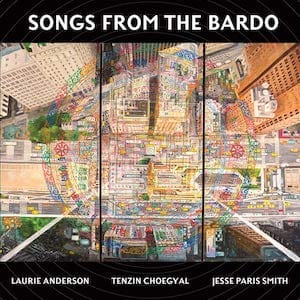 Laurie Anderson, Tenzin Choegyal & Jesse Paris Smith – Songs from the Bardo
Laurie Anderson, Tenzin Choegyal & Jesse Paris Smith – Songs from the Bardo
Smithsonian Folkways Special – 27 September 2019
Songs From The Bardo is described as a “collaborative long-form composition”; finely balancing music and narration, it takes the form of a guided journey through passages from the Tibetan Book Of The Dead (The Bardo Thodol) that speak of life’s most feared transformation, the passage of death and the subsequent period of bardo prior to rebirth. In essence, the bardo is the transitional state of existence intermediate between two lives on earth, wherein the consciousness of the newly deceased becomes aware of and accepts the fact that it has recently died, and reflects upon its past life before progressing to awakening and rebirth.
Songs From The Bardo, then, belies its title in that it’s not in any way either a conventional song-cycle or anything approaching a sequence of song-based compositions. Instead, it unfolds as an ebb-and-flow of sound and words fusing contemporary compositional techniques with the ancient Tibetan Buddhist philosophy. The three performers involved, though from different backgrounds, share a mutual appreciation of Tibetan culture, Buddhist tradition and the breadth and depth of the spiritual world, and their common spiritual vision is conveyed through a sublime, highly meditative narrative that, while calming and soothing in nature, nevertheless demands concentration and commitment from its listeners in order to awaken the mind and lift the consciousness to another level.
Folk Radio UK readers will know Laurie Anderson as one of America’s most daring creative pioneers: a writer, director, visual and audio-visual artist, vocalist, musician and activist renowned for her groundbreaking presentations spanning the worlds of art, theatre and experimental music over the past four decades. It’s less likely, though, that readers will have come across Tenzin Choegyal, a Tibetan artist, composer, activist and cultural ambassador who’s forged a successful career as a musician, both as a solo artist and enthusiastically collaborating with musicians of other cultures, traditions and genres. Or indeed Jesse Paris Smith – a composer, writer, instrumentalist, producer and activist who’s been collaborating globally for the past 15 years (notably to combat climate change – she co-founded Pathway To Paris).
Songs from The Bardo, first performed in 2016, represents the latest stage in Tenzin’s personal adaptation of the profound text that has become his constant companion, and the 77-minute work has become a labour of love in the process, largely through the engagement of his like-minded fellow-collaborators. Initially, Temzin’s is probably the dominant presence in the purely musical sense of what you hear, characterised by some vocal chanting and the sounds of Tibetan instruments – singing bowls, lingbu (bamboo flute), dranyen (fretless lute) and gongs – to which are added cello, piano, violin and some percussion (finger cymbals, etc). Having said that, the musical content of the piece is in nature less that of an accompaniment than a counterpoint, since the text is not set to music in any way. Laurie’s voice, however, is audibly central to the whole composition, for her role is to perform (intone) the narrative that both binds and progresses the soul through the state of bardo, reflecting, with her distinctive combination of gravity and grace, the confusion, fear and quiet ecstasy that the text evokes; the uniquely expressive constancy of her delivery creates its own sense of calmness and joy. Laurie also contributes sinuous, deceptively lyrical violin, while the limpid, appropriately inventive cello lines are provided by Rubin Kodheli and the piano parts by Jesse.
This is not a CD suited to the usual kind of track-by-track commentary or any degree of conventional musical or textual analysis, but instead, it offers the listener a continuous soundscape of free-association that transcends time (and thus tempo): a profound and subtly moving spiritual experience within a looser mental state approaching disembodiment. I’d advise detailed advance reading of the essays within the beautifully-presented accompanying 32-page booklet in order to gain maximum benefit from the mesmerising listening experience this disc affords. Listen without distraction, then, and enlightenment will surely follow.
Songs from the Bardo is out now
